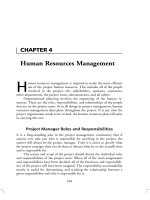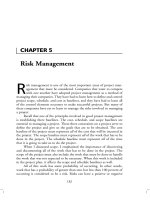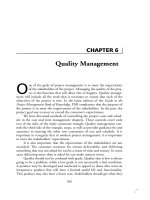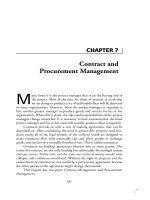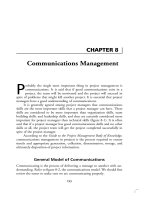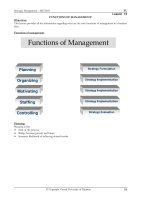Tài liệu Project Management Professional-Chapter 9 ppt
Bạn đang xem bản rút gọn của tài liệu. Xem và tải ngay bản đầy đủ của tài liệu tại đây (107.3 KB, 7 trang )
CHAPTER 9
Professional Responsibility
T
he Project Management Institute engaged the Columbia Assessment
Service (CAS) to study the PMP examination process. This resulted
in changes to the PMP examination. In fact, the exam was revised
considerably as a result of the work that was done.
CAS began by analyzing the responsibilities of project management
professionals (PMPs). Then they specified a plan for the testing of PMPs,
wrote and rewrote questions for the exam, and determined the passing score
for the test. The Project Management Professional (PMP) Role Delineation
Study was published in 2000 to address the responsibilities of a PMP and
the plan for the test. Since the PMP examination is very important to all of
us who are certified as project manager professionals, it is also important that
the examination be one that tests what actually happens in project manage-
ment. The test questions must be fair and accurate and draw information
from every aspect of project management.
Those who participated in the studies and interviews that were part of
the process were not bound to the topics covered in the Guide to the Project
Management Body of Knowledge. For this reason the advisers found that it
was necessary to add a sixth domain to the examination. So in addition to
questions on initiating, planning, executing, controlling, and closing, the
exam now also contains questions on professional responsibility. These ques-
tions will account for 29 questions out of the 200 questions on the exam.
This may seem like a lot, but when you consider that there are a lot of
questions that are common to all of the domains, such as communications
techniques, communicating effectively, coaching, mentoring, personal
211
212 Preparing for the Project Management Professional Certification Exam
strengths and weaknesses, instructional methods and tools, stakeholders’ in-
terests, competing needs and objectives, conflict resolution techniques, and
generating alternatives, it is difficult to relate a specific question on the exam-
ination to a particular domain or process area.
In the area of professional responsibility, tasks are defined, along with
specific knowledge areas and skills that are required for each task. The exami-
nation questions are based on this material. The number of questions for
each topic is based on surveys relevant to the importance of each task that
were done within the project management community.
The following tasks are the basis for the questions that will be on the
PMP examination. They are from the Project Management Professional
(PMP) Role Delineation Study, published by the Project Management Insti-
tute.
Task 1
‘‘Ensure individual integrity and professionalism by adhering to legal re-
quirements and ethical standards in order to protect the community and all
stakeholders.’’
A project manager must be familiar with the laws that govern the proj-
ect in the place where the project is being carried out. The project manager
is the person in charge. In our classes we refer to the project manager as the
one person responsible for everything in the project. If something goes wrong
with the project, it is the project manager’s responsibility. The project man-
ager has responsibility for everything that happens on the project, much as
the captain of a ship is responsible for everything that happens on that ship.
I recently gave testimony in a lawsuit involving a road-milling machine
that accidentally broke a gas line while it was removing several inches of old
road surface. The issue was to decide which of the several insurance compa-
nies would pay for the damages involved resulting from the accident. Since
the project manager was responsible for the project, his insurance company
should be the one to pay. The road construction company had failed to
notify the utility companies, as was their responsibility. Had the utility com-
panies been properly notified that the work was taking place, they might
have averted the accident.
Even though the project manager had specifically instructed the con-
tractor to notify the utility companies, and even though the contractor said
that they had contacted them, the accident remains the project manager’s
responsibility.
9618$$ $CH9 09-06-02 14:59:59 PS
TEAMFLY
Team-Fly
®
213Professional Responsibility
It is important that the project manager have a complete and thorough
knowledge of the stakeholders of the project and also of the community that
surrounds and mingles with the project. In a real sense the members of the
community around the project are stakeholders, and there is a responsibility
to protect them from any harmful effects of the project. I am sure that we
can all recall the day that the Chernobyl nuclear power plant accident oc-
curred in the Ukraine. Many thousands of lives were lost as a result of this
disaster.
Task 2
‘‘Contribute to the project management knowledge base by sharing lessons
learned, best practices, research, etc. within appropriate communities in
order to improve the quality of project management services, build the capa-
bilities of colleagues, and advance the profession.’’
In this task the project manager is expected to contribute to the im-
provement of project management knowledge both by increasing the quality
and by improving the methods and techniques of project management. In
addition to improving the tools of the profession the project manager should
contribute time and energy to help improve the capabilities of colleagues.
Being a member of the Project Management Institute and participating
in the activities of the chapter, the international organization, and the other
international organizations that support project management foster the
growth and improvement of project management. Attending conferences
and meetings and contributing by the presentation of a paper at those con-
ferences can improve the world of project management. Supporting com-
pany training programs and helping to offer training programs through a
local chapter of a project management association will go far to reach these
ends.
Some project managers offer their time to further the developments of
research. This does not mean that you must head up a research study, obtain
a grant for thousands of dollars, or join the faculty of a university. It does
mean that you should fill out questionnaires and surveys when you are asked,
and it does mean that you should respond to students when asked to assist
in research that they are doing.
Many opportunities present themselves to project managers that foster
goodwill and increase the knowledge that others have about project manage-
ment and what it does. I was once asked to speak before the annual meeting
9618$$ $CH9 09-06-02 15:00:01 PS
214 Preparing for the Project Management Professional Certification Exam
of Meeting Planners International. These are the people that plan conven-
tions and conferences in places all over the world. As it turned out, this
group had a great deal of interest in project management. What better places
to practice project management than conventions and conferences? They
have critical schedules, limited budgets, and high visibility. The convention
planner has the opportunity either to upset the plans of thousands of people
and lose millions of dollars for an organization or to make thousands of
people feel that their time and money were well spent. To accomplish these
things we need to have good communication skills and good judgment.
Task 3
‘‘Enhance individual competence by increasing and applying professional
knowledge to improve services.’’
This area of professional responsibility involves understanding your
personal strengths and weaknesses. For this you will need to have a good
knowledge of yourself and make a plan to improve yourself. A project man-
ager has the responsibility to improve his or her competencies. To do this
you must also have knowledge of methods of personal evaluation. As in
modern quality management, it is not the large improvements to our knowl-
edge that are so important, but it is the small increases in our knowledge
and capability over the years that will truly improve our value to ourselves
and others.
A project manager should do a self-assessment periodically and develop
a plan to reach goals for self-improvement and professional competence.
Task 4
‘‘Balance stakeholders’ interests by recommending approaches that strive for
fair resolution in order to satisfy competing needs and objectives.’’
In the development of any project one of the most important things
that we must do is to accomplish the scope of the project. We have a profes-
sional responsibility to make sure that each of the agreed upon stakeholders’
needs is met by the completion of the project. We must also take the respon-
sibility of making the stakeholder aware that there may be better and less
expensive ways of solving the same problem than the way that the stake-
holder has suggested. It is an important responsibility of the project manager
9618$$ $CH9 09-06-02 15:00:01 PS
215Professional Responsibility
and the project team to consider all reasonable alternatives as possible solu-
tions to project problems or as possible ways of achieving project goals.
To be able to do this properly we must be aware of the stakeholders’
business and interests. In chapter 5, Risk Management, we discussed stake-
holder tolerance. This is the level of risk that the stakeholder is willing to
take in the project. It is important that the project manager be able to assess
the risk tolerance of the stakeholder so that the proper risk management plan
can be worked out.
The stakeholder must be considered in many other areas of the project
development as well as in risk management. The project manager and the
project team probably know more about the current technology that the
project will use. The project team then has a responsibility to keep stakehold-
ers informed about changes in technology that may affect the project, even
if there are delays and changes in budget are necessary to use the new tech-
nology.
In all projects there will be conflicts that arise between participants. In
the world of changing needs and expectations, conflicts will need to be re-
solved. Knowledge of the conflict resolution techniques, discussed in chapter
4, is also the responsibility of the project manager. Negotiating and commu-
nications skills serve the project manager well in this area.
Task 5
‘‘Interact with team and stakeholders in a professional and cooperative man-
ner by respecting personal, ethnic, and cultural differences in order to ensure
a collaborative project management environment.’’
The project manager needs to ensure that the project team functions
without prejudice. Today, many companies and projects are international in
nature. Not many companies can afford to run their business without con-
cern for foreign competition and customers. For example, software develop-
ment contracts are now negotiated in different countries, and the Internet is
making us all into one community.
We must be very watchful that we consider the cultural and ethnic
differences of our project team and our customers as well. To do this we
have to have a thorough knowledge of communications and make a sincere
effort to understand the norms of our team and stakeholders. This involves
choosing the appropriate communication channels and considering all of the
filters and inhibitors that are involved.
9618$$ $CH9 09-06-02 15:00:03 PS
216 Preparing for the Project Management Professional Certification Exam
It is easy to make mistakes and appear to be uncooperative. A responsi-
ble project manager must be able to exercise self-control in situations that
involve people with different ethnic and cultural backgrounds. I teach proj-
ect management around the world, and there have been many times when it
has been necessary to forget the practices that I’m used to and adjust my
sensibilities and feelings to the surroundings rather than try to make the
surroundings conform to my feelings.
Communications with people who speak other languages is always
going to present problems, but if you take the time to learn how to say good
morning, please, and thank you, you will go far in developing good relations.
The technique of speaking louder to someone who does not speak English
is not going to improve understanding.
Code of Professional Conduct
It is essential that a project management professional conduct his or her work
in an ethical and legal manner. Without this, team members, customers,
colleagues, employees, and stakeholders will have no confidence in a project
manager’s ability to report on progress or any other aspect of the project.
Trust is an element that must be present for any project to succeed.
PMI has instituted the Project Management Code of Professional Con-
duct in order to encourage self-discipline in the profession. Project managers
are required to report violations of the PMI Code of Professional Conduct.
This has the effect of maintaining standards of conduct. All certified project
management professionals agree to support the Code.
A project management professional is required by the Code to provide
truthful representation of his or her business in any advertising or public
statements regarding cost of services, description of services, and expected
results. He or she has a responsibility to satisfy the scope of the project as
agreed upon unless the customer initiates changes. All sensitive information
must remain confidential when it is obtained while carrying out professional
activities.
The project management professional must also ensure that there are
no conflicts of interest that may interfere with his or her judgment. This
includes offering or accepting gifts for personal gain unless they are in con-
formance with the laws and customs of the country in which they take place.
In managing a project, a project manager takes on the responsibility of
providing qualified professional service. No project manager should take on
9618$$ $CH9 09-06-02 15:00:04 PS
217Professional Responsibility
a project for which he or she is not qualified. The project manager is required
to maintain his or her level of professional skills to serve as project manager
for the types of projects that are being managed. Project managers provide
leadership to ensure that the maximum amount of productivity is achieved.
Quality, cost, and time objectives are to be met as agreed upon.
A project manager must ensure that the workplace is safe, and that all
people working in the area that is the project’s responsibility are protected
from danger. Suitable working conditions must be maintained for the proj-
ect team and any others in the area of the project’s activity.
9618$$ $CH9 09-06-02 15:00:05 PS



